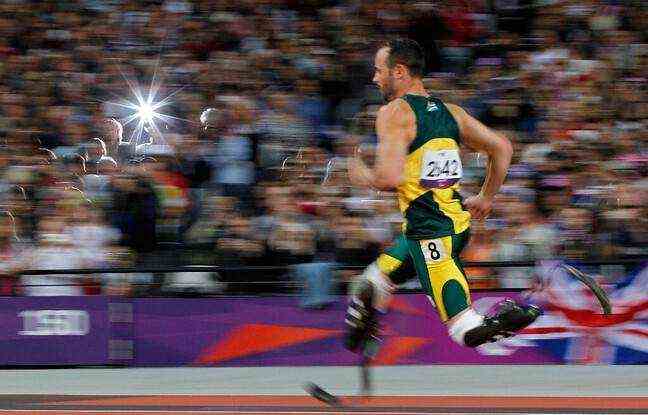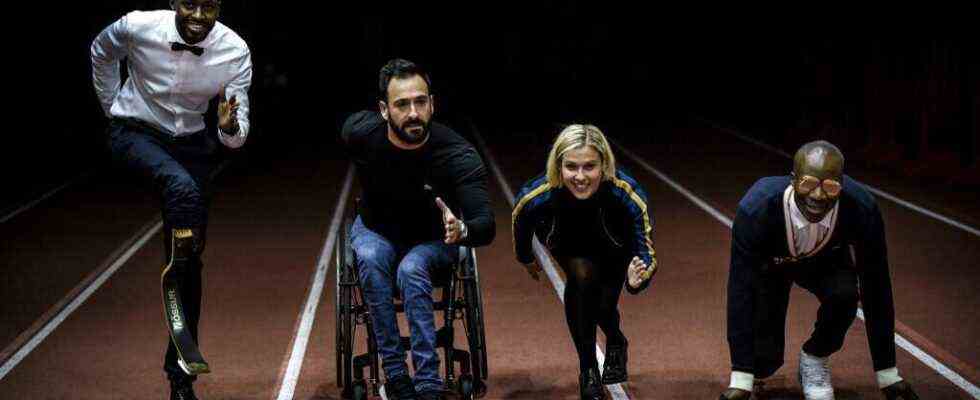Michaël Jérémiasz (second from the left) alongside Jean-Baptiste Alaize, Elodie Lorandi and Tresor Makumba. – JEAN-PHILIPPE KSIAZEK / AFP
- Every Thursday, in its “off-field” section, “20 Minutes” explores new spaces for the expression of sport, unexpected, unusual, clever or booming.
- Former wheelchair tennis champion Michaël Jérémiasz and director Philippe Fontana are currently preparing a film entitled “From shadow to light”.
- The two friends want to show how sport has helped advance the cause of disability around the world for over 150 years.
Setting up a large-scale audiovisual project is often an obstacle course. This, the former disabled athlete Michaël Jérémiasz and his friend and director Philippe Montana know better than anyone. Even more when it comes to selling a topic on disability, which the most cynical in the field will qualify as “little bankable”.
So, to carry out their ambition, that, says the multiple Paralympic medalist in wheelchair tennis, to make “committed films, impact films, films that talk about oppressed minorities and that we do not talk about, little or badly. », They decided to take matters into their own hands and create their own production company. Called “Les Gros Films”, it was created in 2019.
So, after getting their hands on mini-films dealing in various ways with people with disabilities, the two friends embarked on an adventure of a scale that has no equivalent but their ambition: to score a turning point in the question of the acceptance of people with disabilities in our societies by telling 150 years of disability history through the prism of sport. The document, entitled “From the shadows to the light”, should see the light of day by the end of the year 2021.
Sport as an integration tool for people with disabilities
“We are going to meet men and women who fought for their rights, for access to a sports hall, to a club, to a sporting and therefore social life and who, through their struggles, have succeeded in opening doors for as many people as possible ”, presents Jérémiasz. The first Games for the deaf in 1924 at the first Paralympic Games in 1960 in Rome through the audience success of the London Games in 2012, our two friends want to take the public to discover how the history of sport and disability are intimately linked.
To do so, in addition to the financial support of Canal +, the French Adapted Sport Federation and the National Sports Agency, the two friends launched a crownfunding campaign which raised no less than 150,000 euros. “We wanted to create a kind of community of spirit and interests with people who want to move things forward and shake up society’s view on the issue of disability,” explains Philippe Fontana. “The goal was to mobilize beyond the circle of people with disabilities. It worked very well, it’s a real source of pride, ”says Michaël Jérémiasz.
“150 years ago, we were fairground animals”
Why deal with the issue through the prism of sport? Because they realized that sport has helped advance the cause of disability all over the world and normalize people’s perceptions of people with disabilities. “Personally, sport has allowed me to realize that I was capable of achieving things, of being happy, of discovering my own limits and not those that society imposed on me,” says Jérémiasz. He also measures the progress made over the past century and a half: “150 years ago, we, the handicapped, were beasts of the world. There are historical accounts that trace the living conditions of people with disabilities at that time. They were seen as divine abominations ”.
It was not until the beginnings of the industrial era and the wars of the end of the 19th century and of the 20th century, with their share of cripples, broken faces and work-related accidents, for society to finally stop hiding those and those that until then she did not want to see. “It is the beginning of the welfare state which begins to play its role. We will start to consider and support people who have been disabled by society and sport will quickly engage, ”says the director. “The life that I have been able to have over the past 15-20 years as an athlete, then as a high level athlete, is thanks to these people who fought for the condition of the disabled in the world”, applauds Jeremiasz.
The 2016 Paralympic Games and the audience hit
For Philippe Fontana, “sport becomes a communication tool to appear in the eyes of all”. The high point being undoubtedly the Paralympic Games in London in 2012 which, according to Michaël Jérémiasz, “revolutionized Paralympism”.
“The idea of our film, he explains, is also to try to understand why such a success. What made it that there were record audiences on Channel 4, full stadiums, what is it that today we see every day on TV disabled people, parasport in a banal way. It’s totally part of English society now and for that the Games have been a tremendous accelerator. “

“We have realized over the past three, four decades, that the Paralympic Games, when they are broadcast on TV, become a window of exposure for disability and not just sports. I have the weakness to think that it is gradually influencing the public. And the public is society, ”asks the director. The figures attest to this. When in 2016, on the occasion of the Rio Games, France Television decided to give a real place to the Paralympic Games on its antennas, the audience card was there.
The 700 hours of broadcasting of the valid Games attracted 40 million viewers while the Paralympic Games attracted 13.6 million people for only 100 hours of broadcasting. CQFD. As Montana puts it, “it just goes to show that society is ready to see bodies that are different from its own.” For its part, and for the first time in its history, the CNOSF announced on Wednesday that the French team would become one for the next Tokyo Games, without distinction between Olympic and Paralympic athletes. More than a symbol, a way of demonstrating in fact “the importance and the force of inclusion through this magnificent tool that is sport”, according to Marie-Amélie Le Fur, the president of the Paralympic committee.
Olympic and Paralympic, for the first time we are one 🇫🇷 #OneTeam pic.twitter.com/nIDlyVt6gx
– France Team (@EquipeFRA) April 14, 2021
Paris expected at the turn in 2024
Three years before the Paris Games, Jérémiasz and his sidekick hope that France will meet the societal challenge. “This is a wonderful opportunity to show that French society is capable, not because it has been forced but that it wants to, of celebrating Paralympic athletes. We have to ask ourselves how we can use the 2024 Paralympic Games to transform French society on the issue of disability. If we succeed, we will have made good progress. And if not, we will just have had a great Games. But I have the feeling that humanity expects something other than to make beautiful Games. I will do everything in my power to make it happen. ”
Starting with this film, therefore, which he hopes to be able to show “in all the schools of the Republic”. “Our documentary has a real educational aim,” engages the director, who has always been interested in the issue of disability. We want to educate the youngest because it is in schools that we are building the society of tomorrow. The better you know your past, the more chance you have of understanding your present and envisioning your future. “” I would like this film to be a turning point on the question of the acceptance and the normalization of the handicap, does not hesitate to say the former athlete. In a way, we want there to be a before and an after. We want to make our contribution to the building. And with them the 700 or so generous donors who helped finance this extraordinary film.

